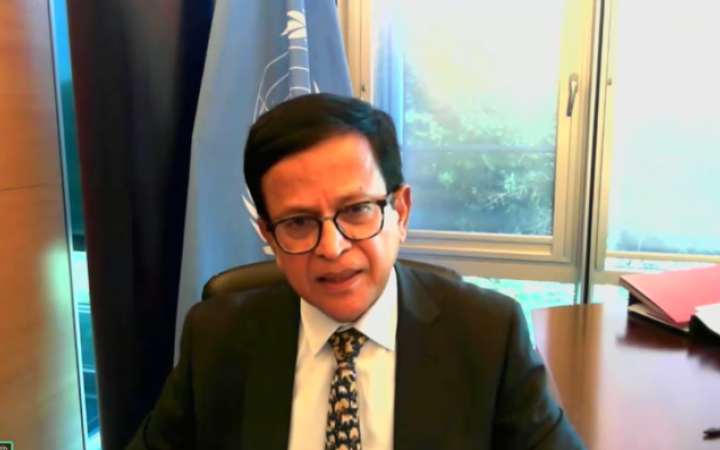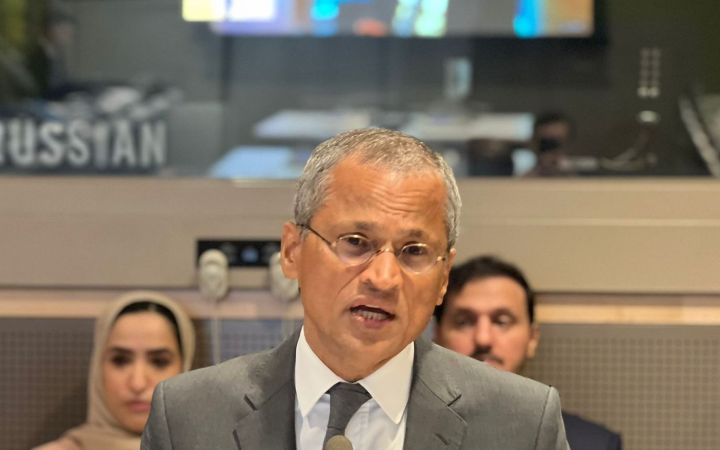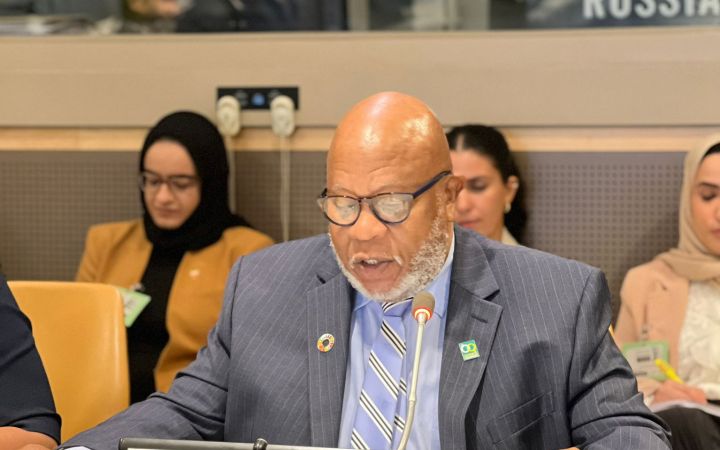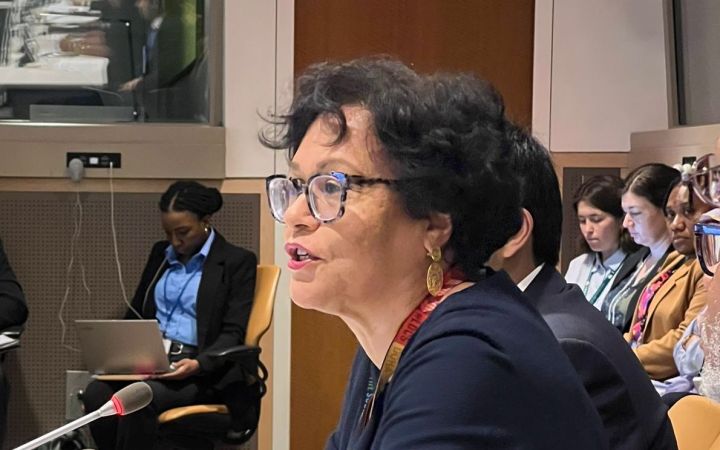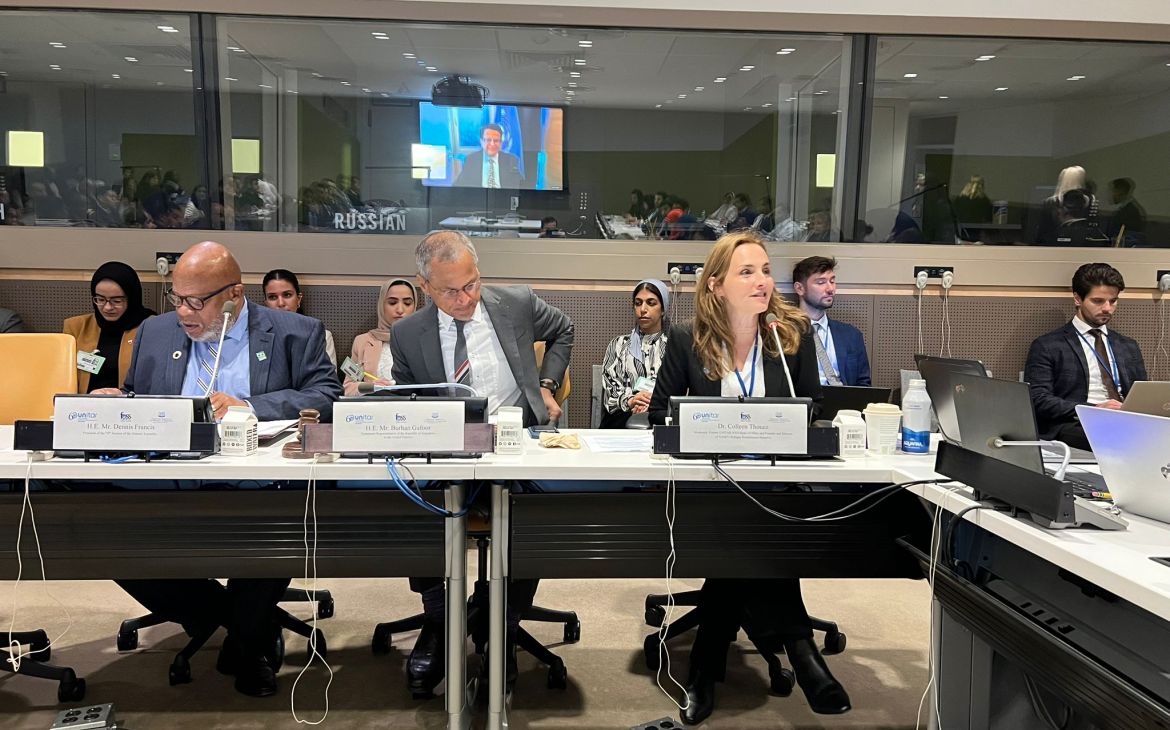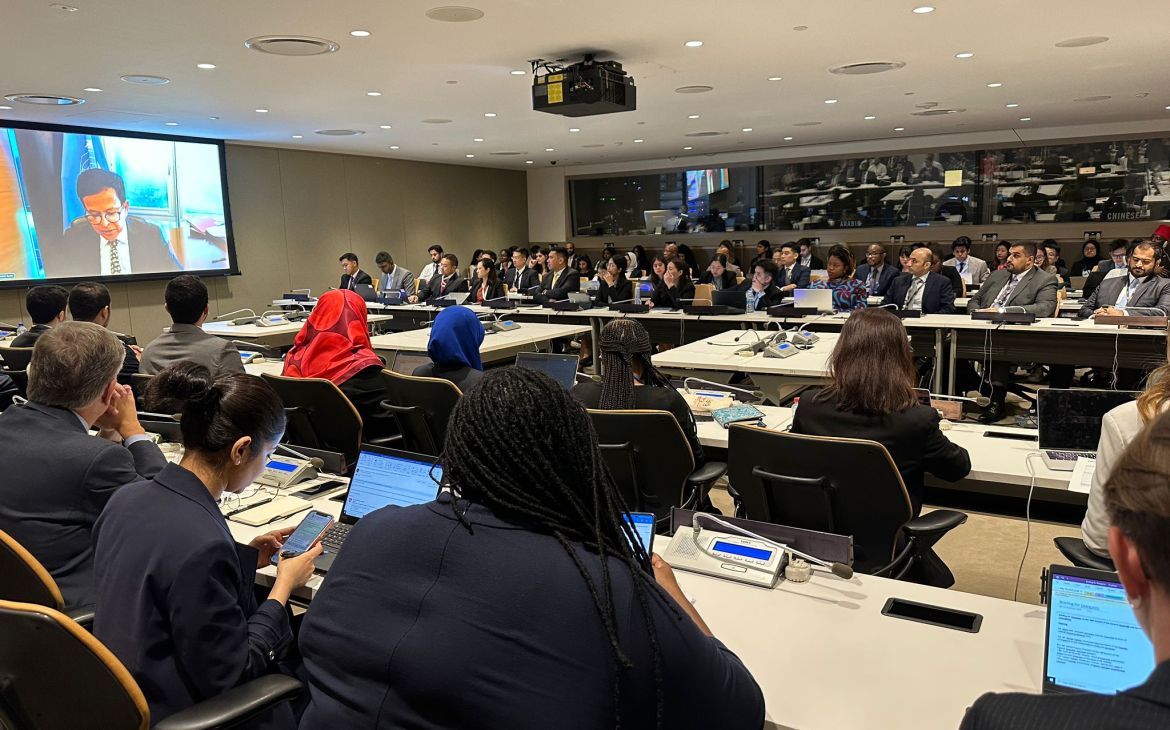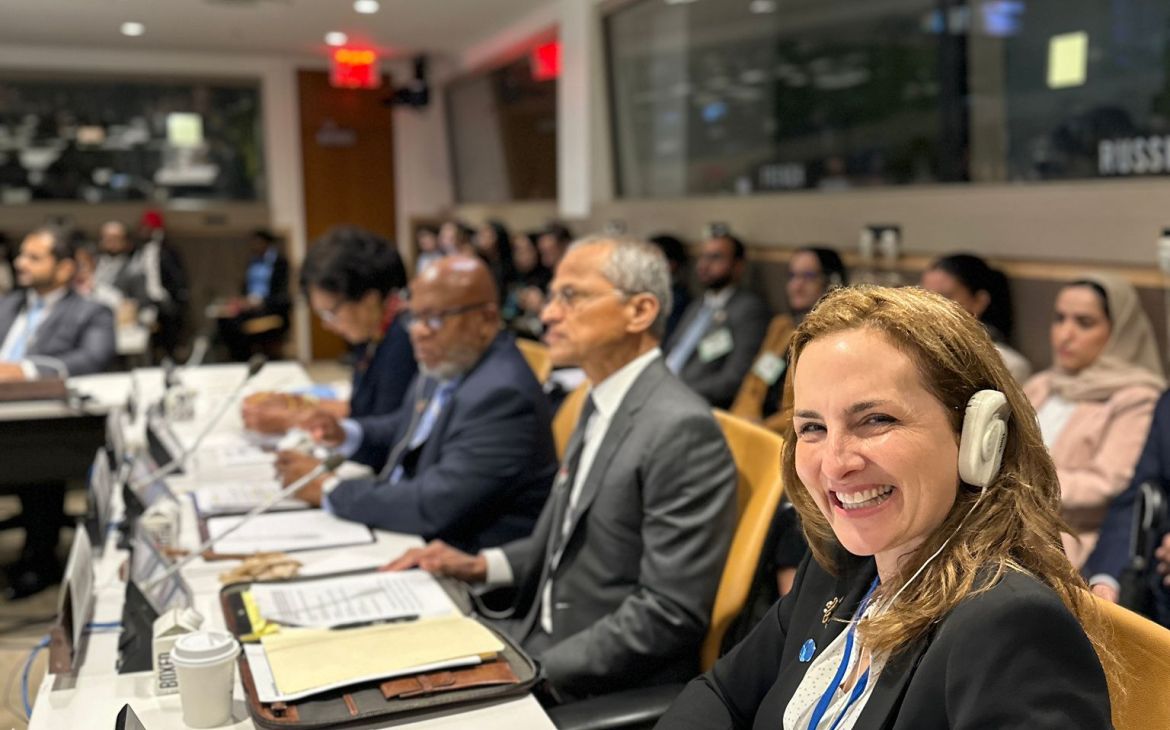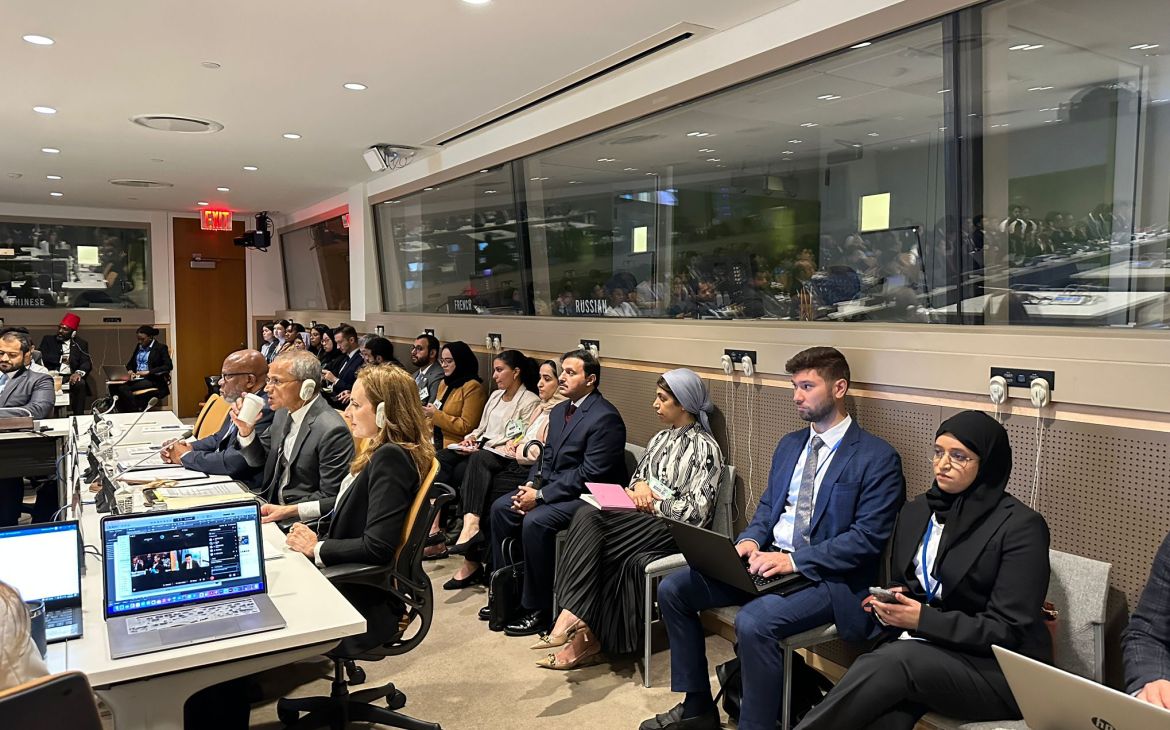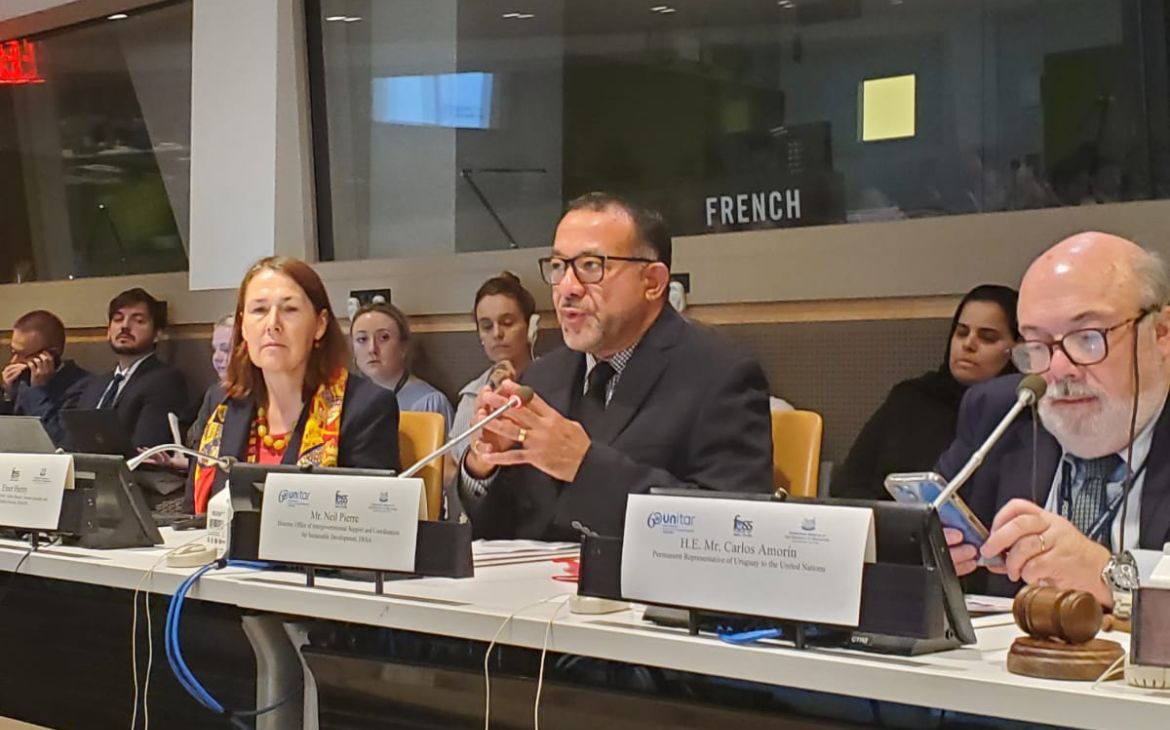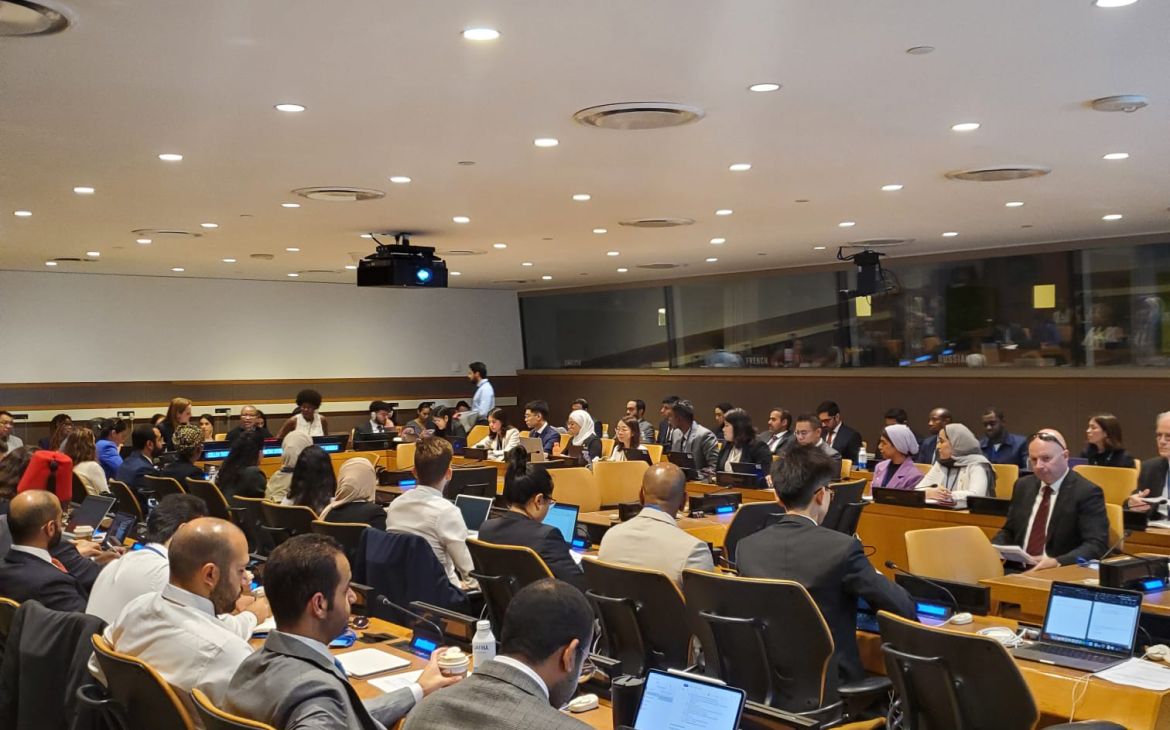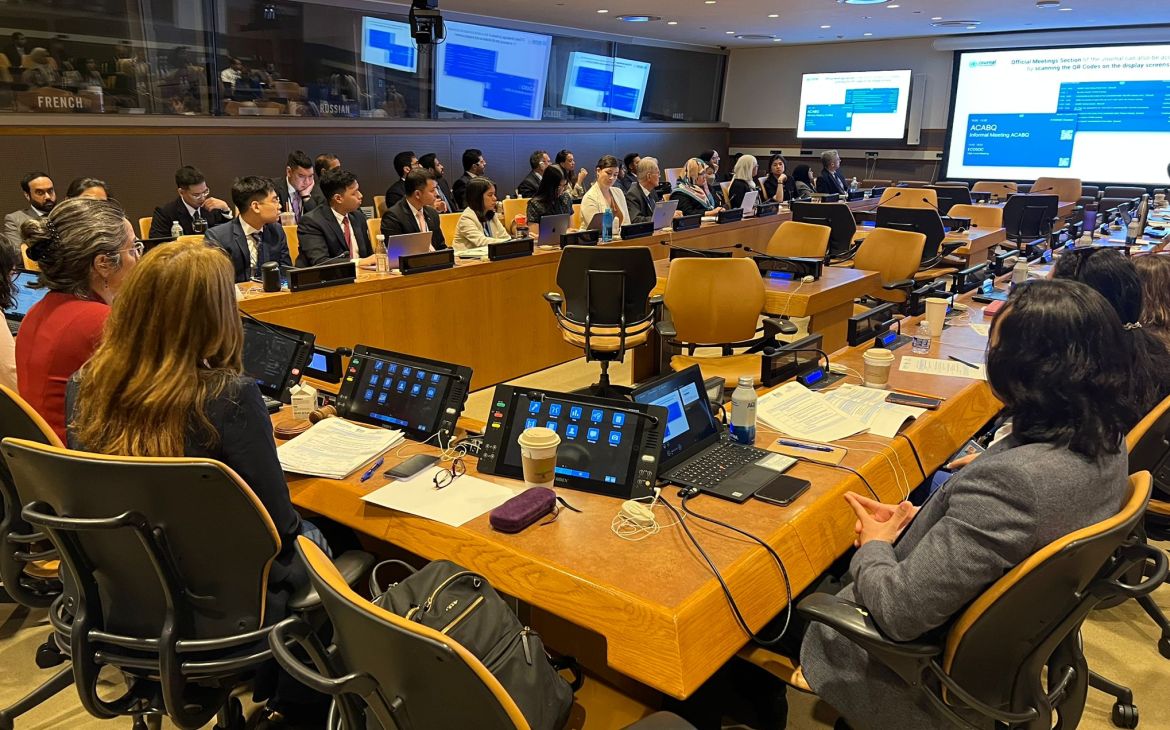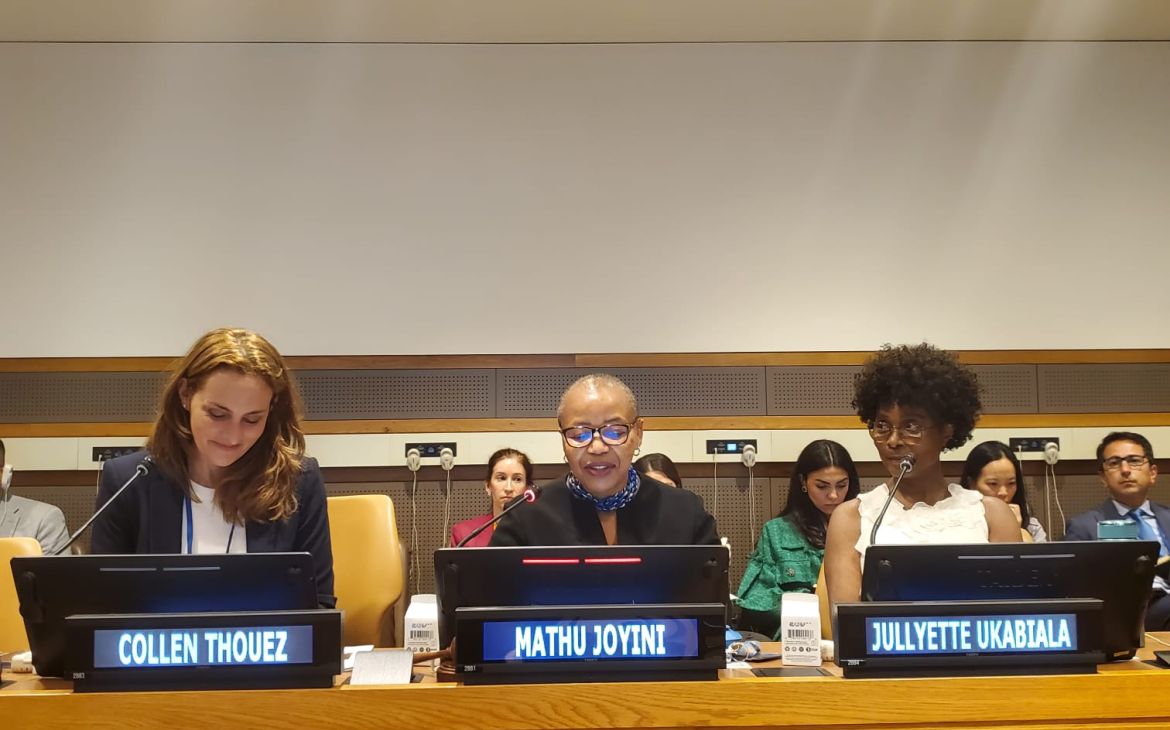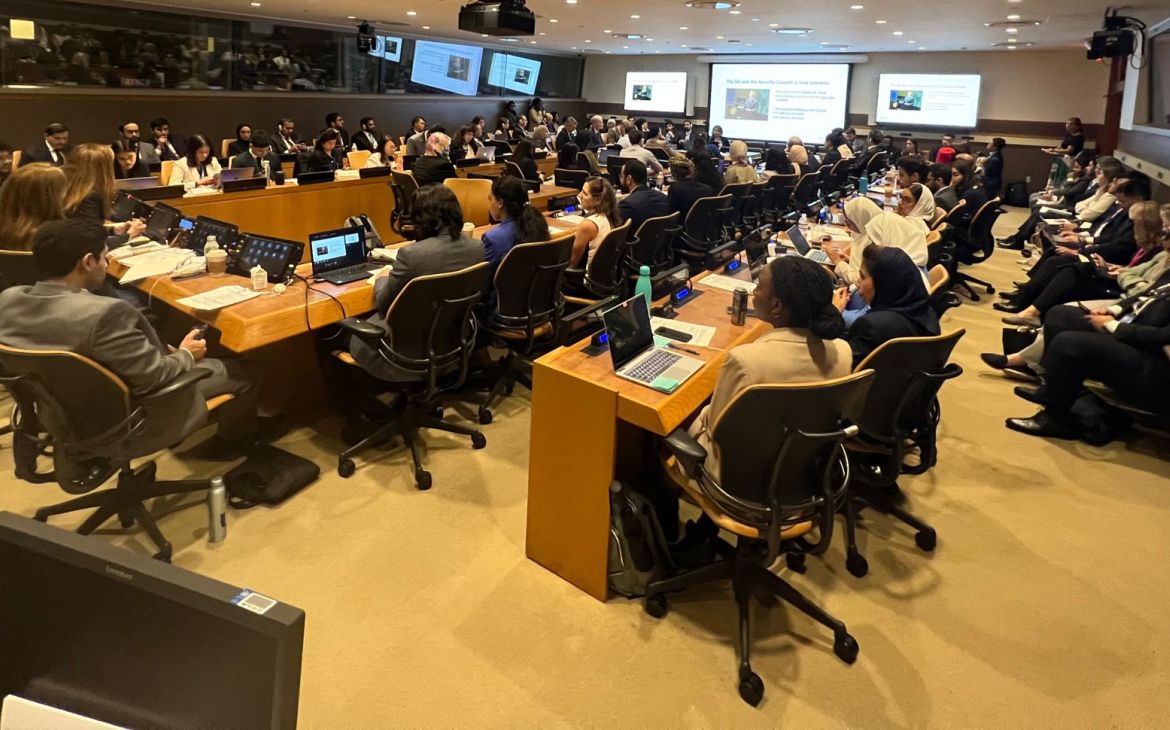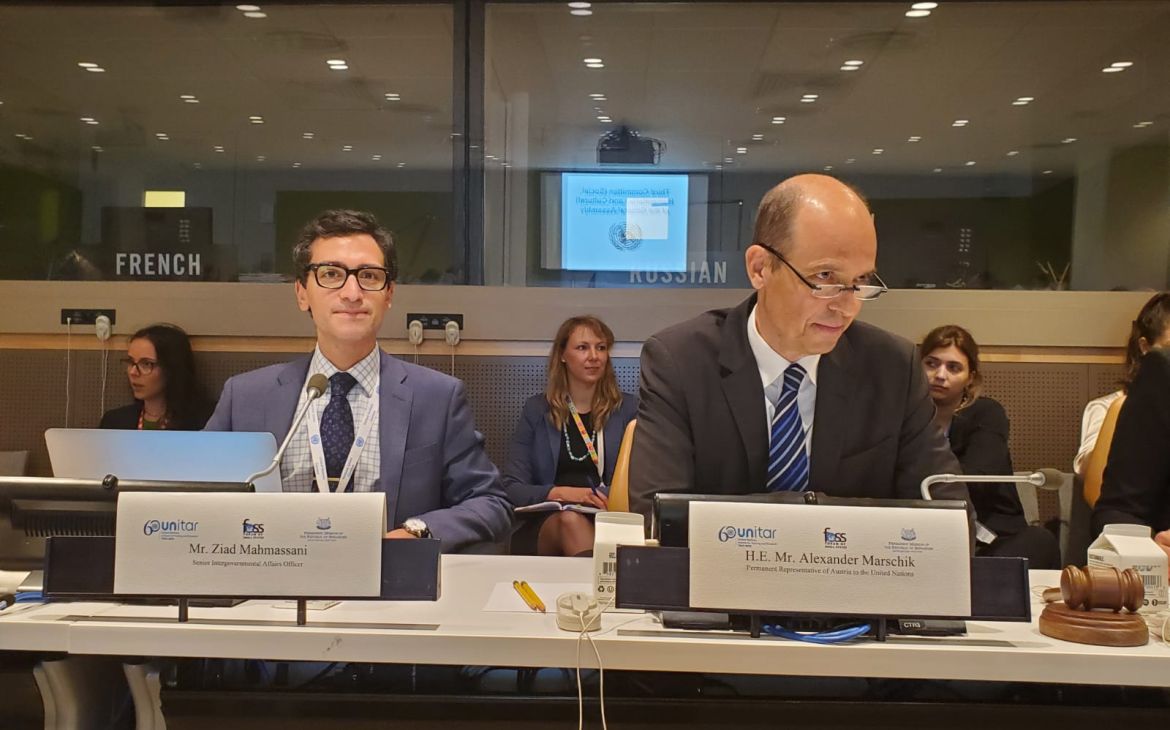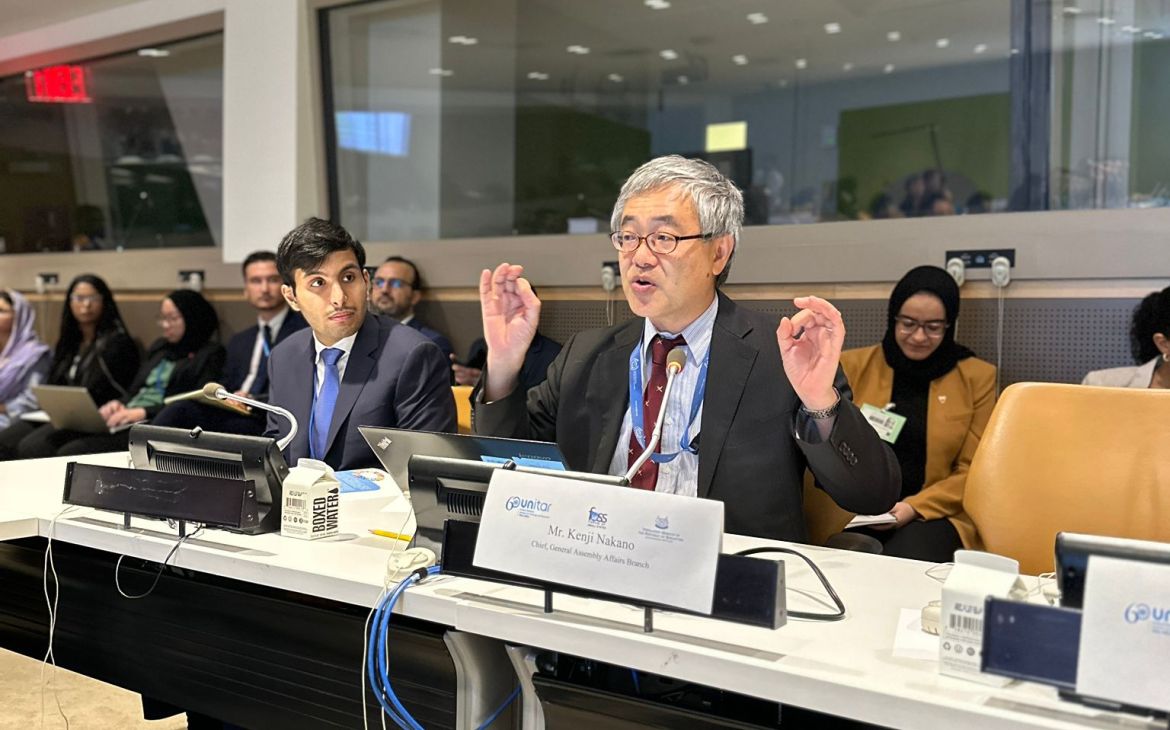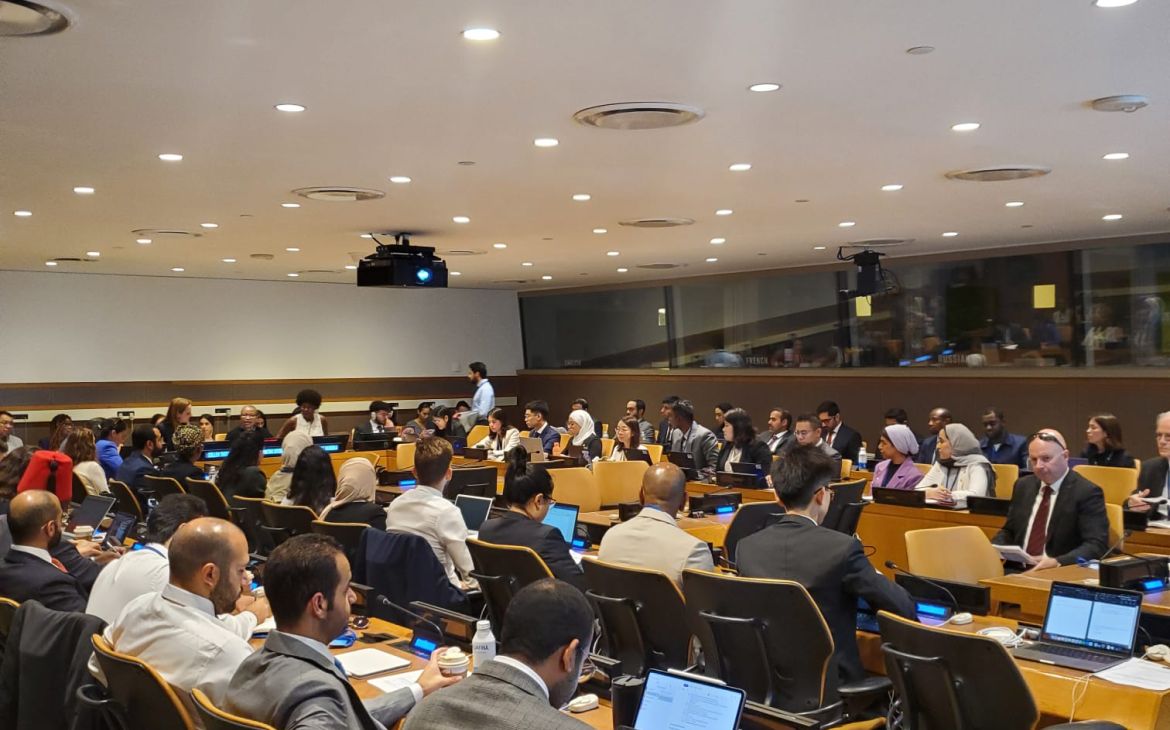18 September 2023, New York, USA - On 11-12 September 2023, The United Nations Institute for Training and Research (UNITAR) office in New York, in partnership with the Permanent Mission of the Republic of Singapore to the United Nations as Chair of the Forum of Small States (FOSS), concluded a two-day course entitled “Briefing New Delegates on the 78th Session of the General Assembly and the Main Committees.” Approximately 160 delegates attended the training in person and online to learn about the operational aspects of the complex work the General Assembly (GA) undertakes.
United Nations Assistant Secretary-General and Executive Director of UNITAR, Nikhil Seth opened the session virtually from his office in the UNITAR Headquarters in Geneva. He spoke on the history and success of the Briefing for New Delegates Training. He thanked the participants, panellists, and sponsors before inviting the keynote speakers to give their introductions.
The first keynote speaker was H.E. Mr Burhan Gafoor, Permanent Representative of the Republic of Singapore to the United Nations, who began with an acknowledgement of the tragic earthquake in Morocco and invited all attendees and panellists to stand for a moment of silence. He went on to speak about the ever-important role of the UN as the only global diplomatic organization. He emphasized the pivotal role diplomacy plays and the importance of dialogue in facilitating solidarity.
H.E. Mr. Dennis Francis, President of the 78th Session of the General Assembly followed H.E. Mr. Gafoor with his own clear and concise view of the challenges the upcoming session will face and a reminder to delegates to continuously find inspiration from the UN Charter, which guides the work of all UN Bodies. President Francis spoke of his deep faith in the multilateral system, the UN’s pivotal role in promoting it, and the importance of prioritizing the voices of all people and provided his four guiding principles: Peace, Prosperity, Progress, and Sustainability. He also offered reminders to the new delegates to continuously re-evaluate how their work is done, rationalize and streamline the agendas, and avoid disagreements and conflicts that hamper the work wherever possible. He ended with thanks to attendants and organizers and talked about how his team recently benefitted from similar UNITAR training.
For the final speaker of the opening segment Ms. Ruth de Miranda, Director of, the General Assembly and ECOSOC Affairs Division, described the Economic and Social Council (ECOSOC) and its diversity. She spoke about the role ECOSOC and the General Assembly have in facilitating decision-making. Afterwards, Dr. Colleen Thouez thanked the keynote speakers and introduced the first set of speakers for the technical portions of the training.
The first speaker, Mr Kenji Nakano, Chief of, the General Assembly Affairs Branch, provided an overview of the GA, reflecting on the history and developments within the GA, indicating the many challenges the congregation has faced in the past. He remembered the tragedy of the World Trade Center attack 22 years ago on the same day and the level of disruption it caused globally. He spoke on the importance of the GA in setting the tone for the year and went over the agenda, before providing several useful resources for new delegates.
Ms. Tomoko Iwata, Secretary of the Credentials Committee and Legal Officer at the Secretariat of the United Nations, began the technical part of the training, describing to new delegates the formal rules of procedure for the GA. She provided a few points of clarity in her office’s capacity to provide formal legal opinions, how draft decisions are submitted, and how revisions are handled.
Transitioning from technical legal procedures to the technical event and ceremonial procedures, Ms Beatrix Kania, Director and chief of Protocol, explained the official protocols and liaison services during the GA High Level Meetings. She began with the importance of capacity restrictions and access to meetings, the flexibility, and limitations of ticket allocations, and covered several maps of the grounds. She spoke in detail about flag protocol, orders of procedures, and photo opportunities, the latter in particular importance for conveying certain messages to the public.
After a break for lunch, delegates and panellists returned to hear from the main committees of the GA and the work that each of them does. Going in number order, H.E. Mr Rytis Paulauskas, Incoming Chair of the First Committee and Permanent Representative of the Republic of Lithuania to the United, spoke about the general work of the First Committee. The First Committee covers disarmament and international security where much of their work involves negotiations around nuclear technology and the prevention of new weapons of mass destruction.
Ms. Sonia Elliott, Secretary of the First Committee, and Chief of the Disarmament and Peace Affairs Branch, DGACM, then took the floor to expand on the First Committee’s agenda for the upcoming GA session, which includes items such as reduction in military budgets, prevention of an arms race in Outer Space, and the general complete and total disarmament. She also covered the formal procedures for drafting documents, the decision-making process, and the process for voting on drafts.
H.E. Mr Carlos Amorín, Incoming Chair of the Second Committee and Permanent Representative of Uruguay to the United Nations, began the second technical session of the afternoon by addressing the purpose of the Second Committee. He spoke on the vast range of coverage for his committee, including financials, financial policy, economics in the context of sustainable development, the eradication of poverty, agriculture development, and many other areas. He emphasized that most of the resolutions are approved by consensus, or without a vote, after lengthy discussions.
We then heard from Neil Pierre, Director, Office of Intergovernmental Support and Coordination for Sustainable Development, Department of Economic and Social Affairs. Mr. Pierre explained how the committee comes to a consensus as mentioned previously by Mr. Amorín. He then described to delegates the four clusters of agenda items which include information and communication technologies, macro-economic policies, sustainable development, agricultural development and food security, and many others. He ended with a note on a few of the planned meetings and events to be held during the upcoming session.
Ms. Emer Herity, Secretary of ECOSOC, ECOSOC Affairs Branch, General Assembly and ECOSOC Affairs Division Department for General Assembly and Conference Management, followed Mr. Pierre’s talking points with a presentation on the breakdown of the organization of the committee. She provided a list of agenda items and went over the phases of each major event leading to the end of the year. She ended with a point on Revitalization, in which every committee has been asked to work on streamlining efforts to improve clarity and efficiency.
H.E. Mr. Alexander Marschik, Incoming Chair of the Third Committee and Permanent Representative of Austria to the United Nations, introduced the room to the work of the Third Committee, which covers social, humanitarian, and cultural topics within the GA. He spoke about the committee being structured around three main aspects: The general debate, Briefing and interactions with human rights groups, and considerations for draft proposals. He concluded with a few tips to optimize work for the incoming members which included time limits for speakers, clustering items and discussion points and having targeted questions to keep the spirit of interactive sessions.
Mr. Ziad Mahmassani, Secretary of the Third Committee and Senior Intergovernmental Affairs Officer was the last presenter of the day. He echoed many of the themes of previous presenters, such as the procedures for documentation and draft proposals. He explained the specific functions of the bureau in dividing responsibilities of draft proposals, reviewing the progress of work and organizing the work of the committee. Finally, end closed the day with tools to aid the new delegates, namely, the E-Delegate online platform.
Dr. Thouez reopened the training thanking attendants for joining for the second day. She then went over the day’s agenda before jumping straight into the work of the fourth committee continuing from yesterday’s chronology.
The first speaker for the second day was H.E. Ms Mathu Joyini, Incoming Chair of the Fourth Committee and Permanent Representative of the Republic of South Africa to the United Nations. Ms. Joyini explained the Fourth Committee’s work, which covers Special Political and Decolonization. She gave a brief overview of the committee’s history in initial decolonization efforts during the first decades of the UN. She explained how the committee has been expanded since the independence of the majority of colonial states, namely in peacekeeping, effects of atomic radiation, and Outer Space affairs.
Ms. Jullyette Ukabiala, Secretary of the Fourth Committee and Senior Intergovernmental Affairs Officer, followed Ms. Joyini’s introduction with a schedule of the Fourth Committee’s work. She provided advice to the delegates when drafting statements for speakers and echoed the previously given points about the usefulness of E-Delegate.
The next set of speakers was H.E. Mr. Osama Mahmoud Abdelkhalek Mahmoud, Incoming Chair of the Fifth Committee and Permanent Representative of the Arab Republic of Egypt to the United Nations, and Ms. Sarah Mueller, Senior Intergovernmental Affairs Officer. Mr. Mahmoud spoke about the affairs of the Fifth Committee, which involved the budgetary and administrative matters of the GA. He talked about the group-work nature of the committee and the need for a common denominator when aiming for consensus. Ms. Mueller spoke to the delegates about what exactly to expect in the upcoming sessions and displayed many of the agenda items of the Fifth Committee.
The last of the main committees, the Sixth Committee, was represented by H.E. Mr. Suriya Chindawongse, Incoming Chair of the Sixth Committee and Permanent Representative of Thailand to the United Nations. He opened with an apt description of the Fifth Committee, which is the legal committee, as “where international law and policy intersect”. He continued a common theme of the past two days in the importance of working toward reaching consensus, particularly as core members of the UN functionality where one’s responsibilities are both to one’s country and the broader interests of the world.
Mr. Arnold Pronto, Principal Legal Officer, Codification Division, Office of Legal Affairs, then took the floor to speak in great detail on the complex and wide range of work that the legal division of the GA covers. These include treaties on terrorism worldwide, tech to access justice for all, and the criminal accountability of UN experts out on missions. He also added points on intersecting such as where climate change can affect international law, namely, the rising of sea levels and what that means for fishing rights and international borders.
The last speaker before the lunch break was Ms. Blanca Montejo, Senior Political Affairs Officer, Security Council Practices and Charter Research Branch, Security Council Affairs Division, SCAD, who spoke on the relationship of the Security Council to the General Assembly. These two critical organs of the UN System work in tandem to ensure the functions of the UN and the passing of resolutions. Ms. Montejo specified where the Security Council had jurisdiction and where the General Assembly took ownership. For example, the General Assembly decided on budgets, and the Security Council adopted binding resolutions. She also covered the procedures of appointing judges to the International Court of Justice, electing the Secretary-General, and election of the five rotating members of the Security Council.
Dr. Thouez welcomed the attendees back from lunch to start the final session of the two-day training for new delegates. This session provided delegates with an introduction to UN elections, negotiation, and decision-making in the General Assembly.
The first speaker of the afternoon session, Mr. Wannes Lint, Intergovernmental Affairs Officer, General Assembly Affairs Branch, provided a clear and concise presentation about the election process, decision-making and negotiations. Mr. Lint also explained the different terminologies and the three types of proposals submitted to the GA plenary.
Perhaps an understated aspect of work in the UN is the fact that there is not one single language of operation and documentation. While the UN has six official languages of operation (Arabic, Chinese, English, French, Spanish, and Russian), any speaker can present in any language. The second panel of the final session was about this critical interpretation work and GA documents and research. Ms. Lana Ayyad, Chief of the Arabic Interpretation Section and Ms. Micaela Becquart, Interpreter of, the Spanish Section, Interpretation Service, spoke about the complex channels of interpretation and translation work that happens often live and instantaneously. They clarified that the UN can provide interpretation in the six official UN languages, however, any language may be used, so long as interpretation is provided.
Ms. Susan Goard, Law Librarian/Training Coordinator, at Dag Hammarskjold Library, finished this section with an introduction to the UN library, the purposes of the library, and how to access resources.
The final section of the training covered conference services, meeting management and documentation. Mr. Dawa Sangey, Senior Documentation Officer, Documentation Management Section, provided an overview of official documentation processes, including specific definitions and terminologies, and the process of submission for different types of documents.
Xin Tong-Maywald, Chief of Section, Conference, Services, DGACM, spoke about the behind-the-scenes work of the meeting management team. These include the official documents and prerequisites needed for official meeting requests and room bookings.
Ms. Meena Sur, Senior Programme Management Officer in DGACM, ended the section with an explanation of UN Journal services. This is a platform delegates may use to search for meetings and conferences that happen daily. It is also a public-facing platform which interested parties may use for research and happenings of UN work.
Dr. Thouez offered the closing remarks of the two-day training congratulating new delegates on completing the course. She provided an appropriate reminder that, while delegates have a responsibility to their home countries, they are also poised as real agents of change for the health and prosperity of all peoples around the world.


